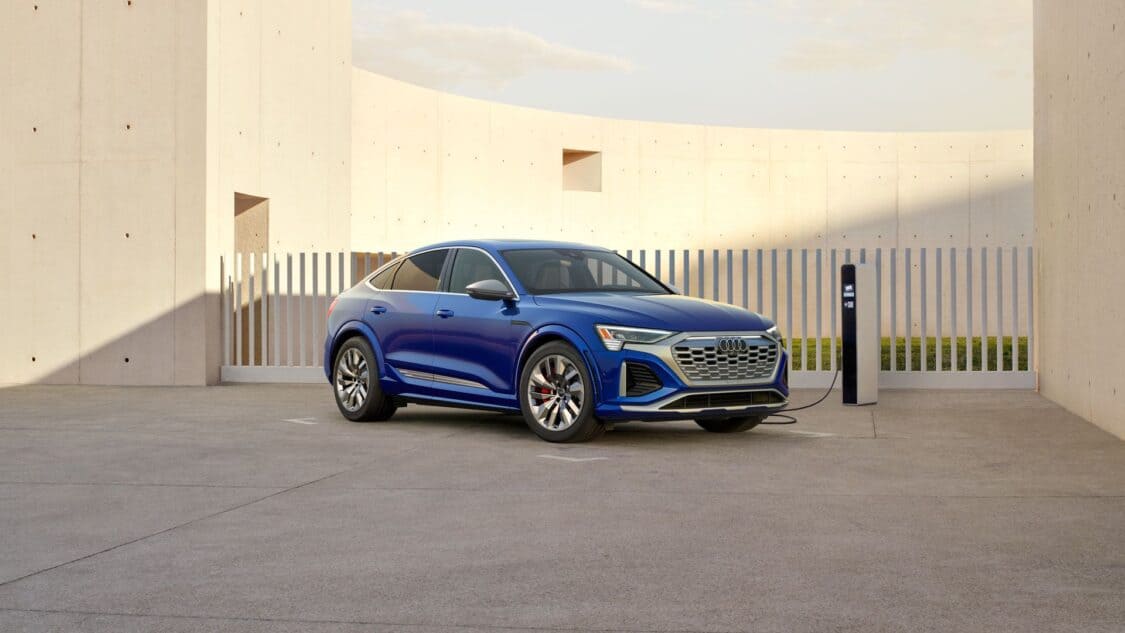- Audi offers 0.99% APR for 60 months on 2024 models like the RS e-tron GT and Q8 Sportback e-tron, and 2.99% APR on 2025 models like the Q4 Sportback e-tron.
- Audi EVs cost around $3.64 per 100 miles to charge at home, compared to $16 for gas-powered vehicles.
- Audi EV owners save $4,600 over 200,000 miles due to fewer moving parts and regenerative braking.
ADVERTISEMENT
If you’re trying to decide between an electric car and a gas-powered one, cost is likely a big factor. Audi’s newest electric vehicles, paired with special November lease and finance deals, make the choice even more appealing.
With interest rates as low as 0.99% APR for 60 months on select models, Audi is making premium electric vehicles more affordable. But how do these costs stack up against gas-powered cars over time? Let’s take a closer look at the numbers, from upfront expenses to fuel savings and other benefits.
ADVERTISEMENT
Audi Electric Car Deals for November
Audi’s current finance offers bring luxury and performance within reach. For those considering an Audi electric car, these November deals provide significant savings:
- 2024 RS e-tron GT Sedan: 0.99% APR for 60 months.
- 2024 Q8 Sportback e-tron SUV: 0.99% APR for 60 months.
- 2024 SQ8 Sportback e-tron SUV: 0.99% APR for 60 months.
- 2025 Q4 Sportback e-tron SUV: 2.99% APR for 60 months.
- 2025 Q4 e-tron SUV: 2.99% APR for 60 months.
- 2025 Q5 PHEV e SUV: 2.99% APR for 60 months.
- 2025 Q6 e-tron SUV: 2.99% APR for 60 months.
- 2025 Q8 e-tron SUV: 2.99% APR for 60 months.
These offers are valid from November 1, 2024, through December 2, 2024, for highly qualified customers financing through Audi Financial Services.

Fuel Costs: Electricity vs. Gasoline
One of the most compelling reasons to go electric is the savings on fuel. Studies show that EV drivers save significantly compared to those who own gas-powered cars.
- Annual Fuel Costs: A 2018 study from the University of Michigan’s Transportation Research Institute found that EVs cost an average of $485 per year to fuel, compared to $1,117 for gas-powered vehicles.
- Efficiency: EVs are 2.6 to 4.8 times more efficient at converting energy into motion. Audi electric SUVs, such as the Q4 e-tron, exemplify this efficiency, allowing drivers to travel farther per dollar spent on energy.
Charging at home during off-peak hours can further reduce costs by 30%. For example, if your electricity rate is $0.13 per kWh and your EV consumes 28 kWh per 100 miles, your cost per 100 miles would be just $3.64. In contrast, driving a gas-powered car averaging 25 miles per gallon with gas at $4.00 per gallon would cost $16 for the same distance.
ADVERTISEMENT
Maintenance Savings and Reliability
Electric vehicles also offer significant maintenance advantages:
- Fewer Parts: EVs like Audi’s e-tron models have no oil changes, spark plugs, or exhaust systems to maintain.
- Lower Costs: According to Consumer Reports, EV owners save an average of $4,600 over 200,000 miles in maintenance costs.
Audi’s advanced engineering and comprehensive warranties make these savings even better. For instance, the Audi Q8 Sportback e-tron comes equipped with regenerative braking, which reduces wear on the braking system, lowering long-term costs.
Incentives and Tax Credits
Federal tax credits and state-level incentives can significantly lower the upfront cost of an electric car. Most qualifying EVs are eligible for up to $7,500 in federal tax credits; however, certain models, like the 2023-2024 Q5 PHEV 55 TFSI e quattro and Q5 S Line 55 TFSI e quattro, qualify for a $3,750 federal tax credit.
Additionally, many states offer extra savings through rebates, reduced registration fees, access to HOV lanes, and discounted electricity rates for EV charging, making it even easier to switch to an electric car.
ADVERTISEMENT
Calculating Your Savings
To estimate your potential savings, consider using tools like the Department of Energy’s fuel-savings calculator. Factor in the following:
- Your vehicle’s efficiency (measured in kWh per 100 miles for EVs or MPG for gas cars).
- Your electricity rate and local gas prices.
- Your driving habits and annual mileage.
For example, a 2025 Audi Q4 e-tron with 28 kWh/100 miles at $0.13 per kWh would cost $3.64 per 100 miles, while a comparable gas SUV would cost $16 at $4.00 per gallon of gas.

The Long-Term Value of Audi Electric Vehicles
Audi’s electric vehicles deliver impressive cost savings along with advanced technology, luxury, and sustainability. With features such as advanced driver-assistance systems, over-the-air updates, and top-of-the-line battery management systems, they provide a high-quality and enjoyable driving experience.
With attractive finance offers and long-term savings on fuel and maintenance, Audi electric vehicles are a practical choice for drivers looking to reduce costs without compromising on performance or style.
Electric cars have never been more affordable, and Audi’s November finance deals make owning one even easier. With low-interest rates, big savings on fuel and maintenance, and additional incentives, Audi electric vehicles are a smart choice compared to gas-powered cars. Ready to make the switch? Visit CarsDirect to check out the latest lease and finance offers.
ADVERTISEMENT

IMAGES: AUDI
FTC: We use income-earning auto affiliate links. Learn more.











